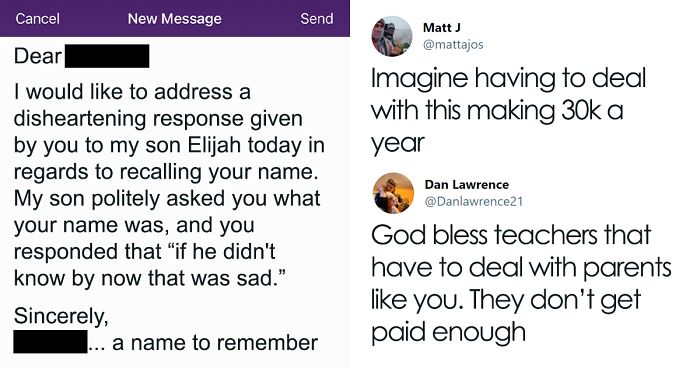
Mom Tweets The Conversation She Had With Her Son’s Teacher After An Online Class Gone Wrong, And It Goes Viral
One mom wasn’t happy with the answer—and attitude—her son got from his teacher after he asked for her name. So, the mom decided to take matters into her own hands and sent the teacher an email.
It took the two of them a little back-and-forth but ultimately they managed to find common ground.
The mom also shared the exchange on Twitter and it instantly blew up, accumulating over 385k likes and 33k retweets, showing that student-teacher-parent relationships are just as relevant in the time of remote learning as they have ever been.
Experts say that substantial evidence exists showing that parent involvement benefits students, including raising their academic results. But there are other advantages for children when parents become involved — namely, increased motivation for learning, improved behavior, more regular attendance, and a more positive attitude about homework and school in general.
So if a parent is concerned about their kid’s education, they certainly aren’t doing them a disservice.
Positive parent-school communications also benefit parents. The manner in which schools communicate and interact with parents affects the quality of parents’ home involvement with their children’s learning. For instance, schools that communicate bad news about student performance more often than recognizing students’ excellence will discourage parent involvement by making parents feel they cannot effectively help their children.
Effective parent-school relationships can also benefit teachers. For example, having more contact with parents, teachers learn more about students’ needs and home environment, which is information they can apply in class. Parents who are involved tend to have a more positive view of teachers, which improves teachers’ morale as well.
Bottom line is, good two-way communication between families and schools is necessary for your everyone. Research shows that the more parents and teachers share relevant information with each other about a student, the better equipped both will be to help that student achieve academically.
So parents shouldn’t feel as though they’re being a nuisance. Whether they have concerns, questions, or just simply want to say “Great job,” it’s perfectly all right to get in touch with their child’s teacher. That’s what good parent-teacher communication is all about.
Parent-teacher communication plays a huge role in helping a child to have a successful academic career. Since parents and teachers know different aspects of a child’s personality, they must work together as a team to solve problems that arise or celebrate gains and milestones.
However, teachers spend a lot of their time in the classroom, so it may not always be easy to get in touch with your child’s teacher. Here are some dos and don’ts of parent-teacher communication that can help you make that connection.
Some people think the mom handled the situation really well
But some have a different opinion
Yeah the mom is totally in the wrong. Why drag it out so much c'mon now. If the tables were reversed and the teacher forgot his name, all hell would break loose. Its just another attempt for a bored parent to fight with a teacher.
What we don't know: the community's opinion of either participant. Was this an ongoing problem with this teacher? Or was the parent a known trouble maker? It makes a difference. Some people refuse to accept responsibility for their actions and are unable to apologize. They deny their contribution to the problem.
Load More Replies...Posting this online, all mixed with swear words and accusations, is as stupid as it is selfish. If her children's good was her sole intention, why share it with the world? Why risk that a seven year old or his friends stumble upon this (particularly now that it is even on BP, which may well entertain families), and see the teacher is accused of talking "BS"? And why not talk this through calmly over Zoom, maybe with the child involved? To me this obviously sounds like a misunderstanding...the child thought the teacher found it sad how he behaved but the teacher seemed to be genuinely sad to not have made enough (positive) impression to be remembered by name.
Some seven year olds can handle money and basic inventory for their parents’ business, remember all the states and capitals, recite names of dinosaurs... stop treating kids like they’re precious and beyond reproach. My comment is coming from another article about a kid being disrespectful to their babysitter and being punished accordingly. In this case, mom flew off the (broom) handle needlessly. She’s not from my coven. EDIT: I don’t know what the best way to parent, I just want to do right by my sister and society. If she’s misbehaving, I’m not doing her any favors by condoning it or coming after anybody who was patient enough to correct her.
Load More Replies...What is this post? Bored Panda, please stop finding mundane conversations between tired and irritated people and label it "content". We're all tired.
Yeah this was viral but I don't quite see why, it's the smallest frigging thing. It didn't need to be made public and dragged out. And I say this knowing full well I'm a damn hypocrite coz I read it all and now I'm commenting XD
Load More Replies...Okay, the teacher may have worded her response better, but maybe she's telling the truth and it just didn't come out as she intended. Anyway, all this fuss around such a non-issue is ridiculous.
It didn't come out as intended, the child misunderstood, regardless apologize for upsetting the child immediately. Do not deny or argue. Apologize. An immediate apology is easiest.
Load More Replies...I'm kinda missing 'Elijah's' side in this. The mother mentioned that she herself overheard the comment. Nowhere in her rant does it mention how it made her son feel. Which to me, as a mother, tells me her son was not bothered by this. And the teacher responded very politely.
I have a question, why must everything be posted on line? Why didn't the parent have a conversation with the teacher and just settle it? When stuff is posted on line there are always the for and against factions. I worked in the school system for years as a middle school counselor, with this new situation of on line teaching because of covid-19 it has become extremely difficult and no one really knows what they are doing. So every one give each other a break for the children's sake please, thank you.
BP often writes that "tweets go viral" but in reality they are barely noticed. Except, of course, on BP.
No offense the mom seems to be seeing something that isn't there. It reminds me of the parents that believe their child can do no wrong.
I think people have very raw emotions, especially after the last year..You can ALWAYS fins something to 'bitch' about, but please, have a little empathy for the teacher. This has been a hellish year for everyone, I thought the mom blew it totally out of proportion, IMHO.
She could always homeschool her kid. It sounds like he needs to be in the slow classes anyway. You can by the way she talks exactly who she is. Another "I'm the victim" and "EVERYONE is against US"...
The mom is in the wrong I had a substitute teacher tell me that it was sad not to have a phone in this day and age and I just brushed it off no biggy cause it is kinda sad but it doesn’t get to me that much to try to get revenge on her like that.
Tell your son I have a hard time remembering people's names too. I've had individuals angry at me for not remembering thinking I'm being disrespectful. I'm not...my brain just doesn't work that way. But one thing that has helped is word association or linking it to something I remember..like another person I am familiar with or something famously eventful that I remember. See if teaching your son that same technique might help. Like if the person says their name is Mary...link it to "Like Nana Mary" or "That's the name of Jesus's Mom." You will find he will retain names better. I also help people with it by saying my name "Carol....like Christmas Carol." It works!
And her son should tell mommy to nost post things online that might backfire.
Load More Replies...Nothing like teaching your child to make a mountain out of a molehill. Get a grip, there are wayyyy more important lessons to teach your child, like tolerance to other people's shortcomings. But, I guess you weren't taught that either. It's people like YOU that are what's wrong with our society!!!
Shenanigans! The mom is blowing this up. The teacher is clearly polite in her responses and the mom is making a huge deal out of a conversation that she wasn't there to witness. The kid was probably trying to distract or redirect the mom by bringing up this conversation that happened with the teacher to take her attention away from something else.
Mom needs to spend more time in her son's virtual classroom to learn proper grammar and spelling. What a joke!
Damn a lot of y'all don't understand what online school is like now. A 7 y/o, in class with his teacher 40 minutes a week? It's not surprising he forgot! It also seems like it was just a communication mishap, and they worked it out. I celebrate the fact that the teacher & mom could talk it out with civility
I once let a woman call me Christine for a year because I was too timid to correct her, lol. So I think the kid having the courage to ask is great. Should he have remembered by now? Yeah, assuming he isn’t experiencing any major life events, learning difficulties, pain, and isn’t hungry, tired, or sick....but the fact is he did forget. Could you imagine if you got up the courage to ask someone you’ve known awhile and seen often what their name is again and they said what the teacher did instead of just saying, “haha, that’s ok, it’s ______.” It would suck. With that said, mom needs to get off her high horse and stop setting the example for her son that you can and should demand respect from someone out of one side of your mouth while disrespecting them out of the other. What kind of message is that?
I think the whole situation got out of hand. I am very glad it got easily resolved.
is this what we call "making mountains out of molehills"? cause it kind of soulnds like it
The mom was wrong to post on social media, the teacher was wrong in her initial answer (mom heard it) and then her response to the mom. Not all teachers are good at it, most are great, a lot aren't. have experienced this first hand
I really would not have posted but I would have spoken to the teacher. Have 4 children all adults now and no not all teachers should be teaching, the majority are great but the minority tend to leave a bad impression. Seems like the ones that should retire move to the younger grades and sets a very bad precedent for kids just starting school. We are all stressed, kids, teachers and parents. That was not a good response and the mom heard it.
I can't even begin to say how hard it is for my 7 year old to attempt to learn virtually. I say attempt because that's what it was, 3 weeks before I decided to do what I never wanted to (but always thought may be best): homeschool. He has so many "aha" moments it's ridiculous. Meanwhile, on DoJo, I see his teacher constantly out, so many differences from original instructions, etc. I was basically teaching him anyways, before I pulled him out. I adore and respect teachers, but just like the police, the few who shouldn't be there are ruining society, slowly but surely.
I thinking saying "it made you sad that he couldn't remember my name" is extremely narcissistic. What utter BS. This teacher was completely in the wrong. If you work with young children for YEARS, it seems "sad" to me that you have no empathy for the way their brains work, for basically blaming a child for "making you sad" when all he did was ask your name, and for still not getting it once you were told how it affected the child. Teacher ITA. No excuses. Aside from the fact that no one "makes you sad". That is on you and if the fact that a young child in this situation doesn't remember your name "makes you sad", I would say grow the hell up and get some more training or choose another career. PS- I am a strong supporter of educators and believe that in the USA they get none of the respect and a tenth of the money they generally deserve. They are a huge influence on a child's life. I could not do the job. But in every profession, there are some who are just not good at it. She's not
Seven months in? Okay, if it were, say first quarter/early-mid second quarter, I could understand that, but 7 months in? I could recite every teacher/sub I had at 7 months in!
Load More Replies...I’m sorry but I got to side with the teacher. She 100% shouldn’t have said what she said but I don’t think she meant to be rude, it might have just slipped accidentally
Yeah, besides, we’re well into the third quarter, anybody who doesn’t know their teachers name by the third quarter is uh, forgetful.
Load More Replies...I believe GRACE should be extended to the child AND teacher, and even to the mom because COVID has made people short tempered and cranky. Hard to believe if everything were running smooth, a mom would be concerned enough to send a teacher this, and then post to social media as if the teacher had committed some horrible offense. Sorry her son felt embarrassed, and the teacher had to deal with yet another parent complaint, and this mom embarrassed herself thinking she was shaming the teacher.
People in general do this, try to make people feel stupid for a skiff a question. How are people supposed to learn anything if they're made afraid to ask? Especially on social media, I see people being mocked for not knowing something but this is made worse by the fact that this is a teacher treating a student this way. That's really awful.
Exactly!! This was my point too and I got heavily downvoted. This incident will discourage the child from asking questions in the future. "It's not big deal" they're saying, but it IS a big deal for the child. He got humiliated in front of the entire class and these things stick with you for years and years
Load More Replies...I might not be fully understanding this post, but both the teacher and the mother are coming across as a-holes here. To me, anyway.
I'm not going to choose a side without more information.
The teacher really didn’t have to call out a seven year old because he couldn’t remember his name. And again if they never use the teachers name in class maybe he wouldn’t remember it. I myself didn’t know a teachers name the whole year because I forgot it the one time she told me and nobody else addressed her by her name.
And everything else was in a box to the left. To the left to the left :)
Load More Replies...Yeah the mom is totally in the wrong. Why drag it out so much c'mon now. If the tables were reversed and the teacher forgot his name, all hell would break loose. Its just another attempt for a bored parent to fight with a teacher.
What we don't know: the community's opinion of either participant. Was this an ongoing problem with this teacher? Or was the parent a known trouble maker? It makes a difference. Some people refuse to accept responsibility for their actions and are unable to apologize. They deny their contribution to the problem.
Load More Replies...Posting this online, all mixed with swear words and accusations, is as stupid as it is selfish. If her children's good was her sole intention, why share it with the world? Why risk that a seven year old or his friends stumble upon this (particularly now that it is even on BP, which may well entertain families), and see the teacher is accused of talking "BS"? And why not talk this through calmly over Zoom, maybe with the child involved? To me this obviously sounds like a misunderstanding...the child thought the teacher found it sad how he behaved but the teacher seemed to be genuinely sad to not have made enough (positive) impression to be remembered by name.
Some seven year olds can handle money and basic inventory for their parents’ business, remember all the states and capitals, recite names of dinosaurs... stop treating kids like they’re precious and beyond reproach. My comment is coming from another article about a kid being disrespectful to their babysitter and being punished accordingly. In this case, mom flew off the (broom) handle needlessly. She’s not from my coven. EDIT: I don’t know what the best way to parent, I just want to do right by my sister and society. If she’s misbehaving, I’m not doing her any favors by condoning it or coming after anybody who was patient enough to correct her.
Load More Replies...What is this post? Bored Panda, please stop finding mundane conversations between tired and irritated people and label it "content". We're all tired.
Yeah this was viral but I don't quite see why, it's the smallest frigging thing. It didn't need to be made public and dragged out. And I say this knowing full well I'm a damn hypocrite coz I read it all and now I'm commenting XD
Load More Replies...Okay, the teacher may have worded her response better, but maybe she's telling the truth and it just didn't come out as she intended. Anyway, all this fuss around such a non-issue is ridiculous.
It didn't come out as intended, the child misunderstood, regardless apologize for upsetting the child immediately. Do not deny or argue. Apologize. An immediate apology is easiest.
Load More Replies...I'm kinda missing 'Elijah's' side in this. The mother mentioned that she herself overheard the comment. Nowhere in her rant does it mention how it made her son feel. Which to me, as a mother, tells me her son was not bothered by this. And the teacher responded very politely.
I have a question, why must everything be posted on line? Why didn't the parent have a conversation with the teacher and just settle it? When stuff is posted on line there are always the for and against factions. I worked in the school system for years as a middle school counselor, with this new situation of on line teaching because of covid-19 it has become extremely difficult and no one really knows what they are doing. So every one give each other a break for the children's sake please, thank you.
BP often writes that "tweets go viral" but in reality they are barely noticed. Except, of course, on BP.
No offense the mom seems to be seeing something that isn't there. It reminds me of the parents that believe their child can do no wrong.
I think people have very raw emotions, especially after the last year..You can ALWAYS fins something to 'bitch' about, but please, have a little empathy for the teacher. This has been a hellish year for everyone, I thought the mom blew it totally out of proportion, IMHO.
She could always homeschool her kid. It sounds like he needs to be in the slow classes anyway. You can by the way she talks exactly who she is. Another "I'm the victim" and "EVERYONE is against US"...
The mom is in the wrong I had a substitute teacher tell me that it was sad not to have a phone in this day and age and I just brushed it off no biggy cause it is kinda sad but it doesn’t get to me that much to try to get revenge on her like that.
Tell your son I have a hard time remembering people's names too. I've had individuals angry at me for not remembering thinking I'm being disrespectful. I'm not...my brain just doesn't work that way. But one thing that has helped is word association or linking it to something I remember..like another person I am familiar with or something famously eventful that I remember. See if teaching your son that same technique might help. Like if the person says their name is Mary...link it to "Like Nana Mary" or "That's the name of Jesus's Mom." You will find he will retain names better. I also help people with it by saying my name "Carol....like Christmas Carol." It works!
And her son should tell mommy to nost post things online that might backfire.
Load More Replies...Nothing like teaching your child to make a mountain out of a molehill. Get a grip, there are wayyyy more important lessons to teach your child, like tolerance to other people's shortcomings. But, I guess you weren't taught that either. It's people like YOU that are what's wrong with our society!!!
Shenanigans! The mom is blowing this up. The teacher is clearly polite in her responses and the mom is making a huge deal out of a conversation that she wasn't there to witness. The kid was probably trying to distract or redirect the mom by bringing up this conversation that happened with the teacher to take her attention away from something else.
Mom needs to spend more time in her son's virtual classroom to learn proper grammar and spelling. What a joke!
Damn a lot of y'all don't understand what online school is like now. A 7 y/o, in class with his teacher 40 minutes a week? It's not surprising he forgot! It also seems like it was just a communication mishap, and they worked it out. I celebrate the fact that the teacher & mom could talk it out with civility
I once let a woman call me Christine for a year because I was too timid to correct her, lol. So I think the kid having the courage to ask is great. Should he have remembered by now? Yeah, assuming he isn’t experiencing any major life events, learning difficulties, pain, and isn’t hungry, tired, or sick....but the fact is he did forget. Could you imagine if you got up the courage to ask someone you’ve known awhile and seen often what their name is again and they said what the teacher did instead of just saying, “haha, that’s ok, it’s ______.” It would suck. With that said, mom needs to get off her high horse and stop setting the example for her son that you can and should demand respect from someone out of one side of your mouth while disrespecting them out of the other. What kind of message is that?
I think the whole situation got out of hand. I am very glad it got easily resolved.
is this what we call "making mountains out of molehills"? cause it kind of soulnds like it
The mom was wrong to post on social media, the teacher was wrong in her initial answer (mom heard it) and then her response to the mom. Not all teachers are good at it, most are great, a lot aren't. have experienced this first hand
I really would not have posted but I would have spoken to the teacher. Have 4 children all adults now and no not all teachers should be teaching, the majority are great but the minority tend to leave a bad impression. Seems like the ones that should retire move to the younger grades and sets a very bad precedent for kids just starting school. We are all stressed, kids, teachers and parents. That was not a good response and the mom heard it.
I can't even begin to say how hard it is for my 7 year old to attempt to learn virtually. I say attempt because that's what it was, 3 weeks before I decided to do what I never wanted to (but always thought may be best): homeschool. He has so many "aha" moments it's ridiculous. Meanwhile, on DoJo, I see his teacher constantly out, so many differences from original instructions, etc. I was basically teaching him anyways, before I pulled him out. I adore and respect teachers, but just like the police, the few who shouldn't be there are ruining society, slowly but surely.
I thinking saying "it made you sad that he couldn't remember my name" is extremely narcissistic. What utter BS. This teacher was completely in the wrong. If you work with young children for YEARS, it seems "sad" to me that you have no empathy for the way their brains work, for basically blaming a child for "making you sad" when all he did was ask your name, and for still not getting it once you were told how it affected the child. Teacher ITA. No excuses. Aside from the fact that no one "makes you sad". That is on you and if the fact that a young child in this situation doesn't remember your name "makes you sad", I would say grow the hell up and get some more training or choose another career. PS- I am a strong supporter of educators and believe that in the USA they get none of the respect and a tenth of the money they generally deserve. They are a huge influence on a child's life. I could not do the job. But in every profession, there are some who are just not good at it. She's not
Seven months in? Okay, if it were, say first quarter/early-mid second quarter, I could understand that, but 7 months in? I could recite every teacher/sub I had at 7 months in!
Load More Replies...I’m sorry but I got to side with the teacher. She 100% shouldn’t have said what she said but I don’t think she meant to be rude, it might have just slipped accidentally
Yeah, besides, we’re well into the third quarter, anybody who doesn’t know their teachers name by the third quarter is uh, forgetful.
Load More Replies...I believe GRACE should be extended to the child AND teacher, and even to the mom because COVID has made people short tempered and cranky. Hard to believe if everything were running smooth, a mom would be concerned enough to send a teacher this, and then post to social media as if the teacher had committed some horrible offense. Sorry her son felt embarrassed, and the teacher had to deal with yet another parent complaint, and this mom embarrassed herself thinking she was shaming the teacher.
People in general do this, try to make people feel stupid for a skiff a question. How are people supposed to learn anything if they're made afraid to ask? Especially on social media, I see people being mocked for not knowing something but this is made worse by the fact that this is a teacher treating a student this way. That's really awful.
Exactly!! This was my point too and I got heavily downvoted. This incident will discourage the child from asking questions in the future. "It's not big deal" they're saying, but it IS a big deal for the child. He got humiliated in front of the entire class and these things stick with you for years and years
Load More Replies...I might not be fully understanding this post, but both the teacher and the mother are coming across as a-holes here. To me, anyway.
I'm not going to choose a side without more information.
The teacher really didn’t have to call out a seven year old because he couldn’t remember his name. And again if they never use the teachers name in class maybe he wouldn’t remember it. I myself didn’t know a teachers name the whole year because I forgot it the one time she told me and nobody else addressed her by her name.
And everything else was in a box to the left. To the left to the left :)
Load More Replies...
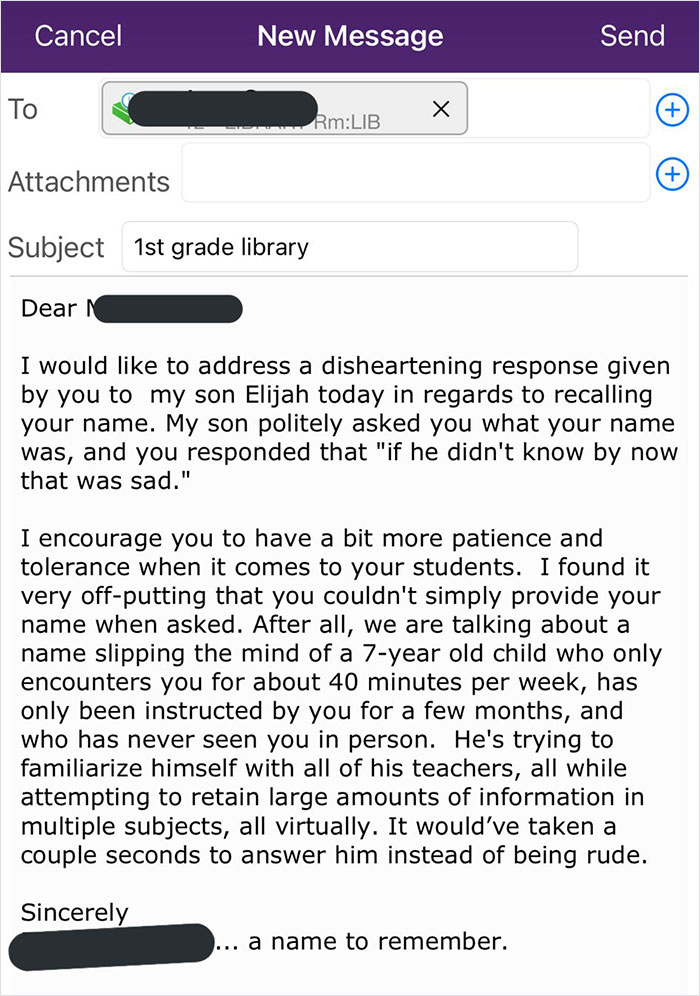

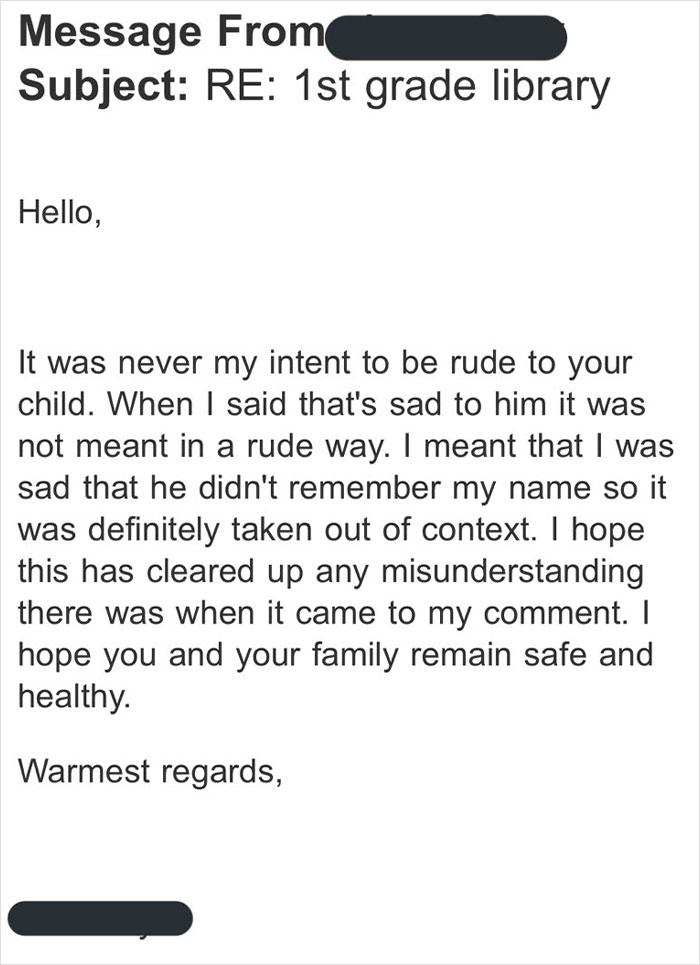



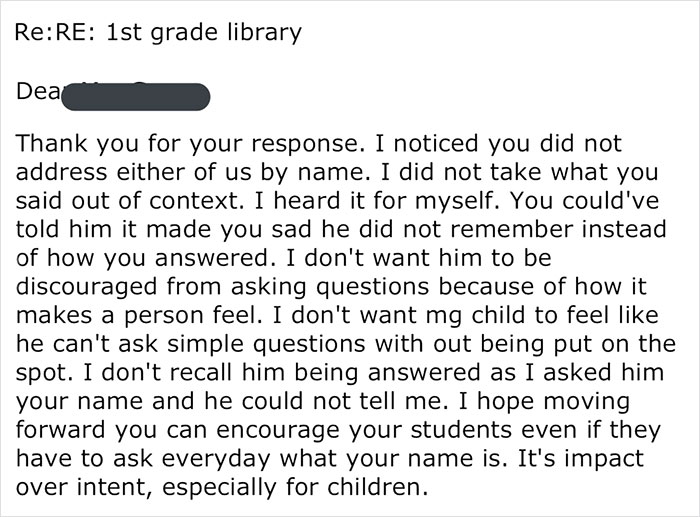
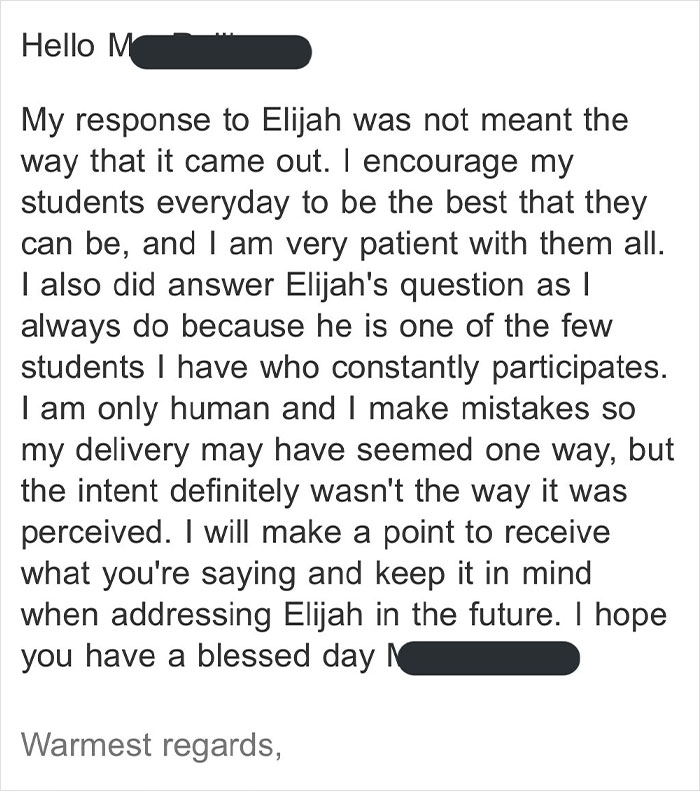

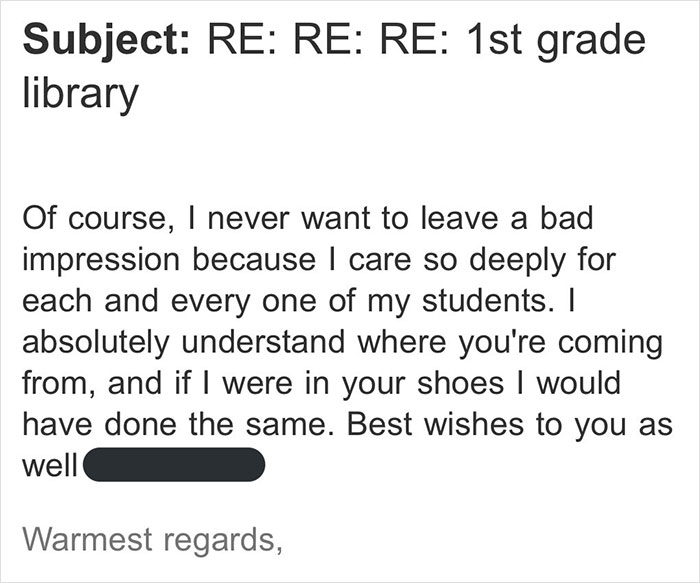

















17
74